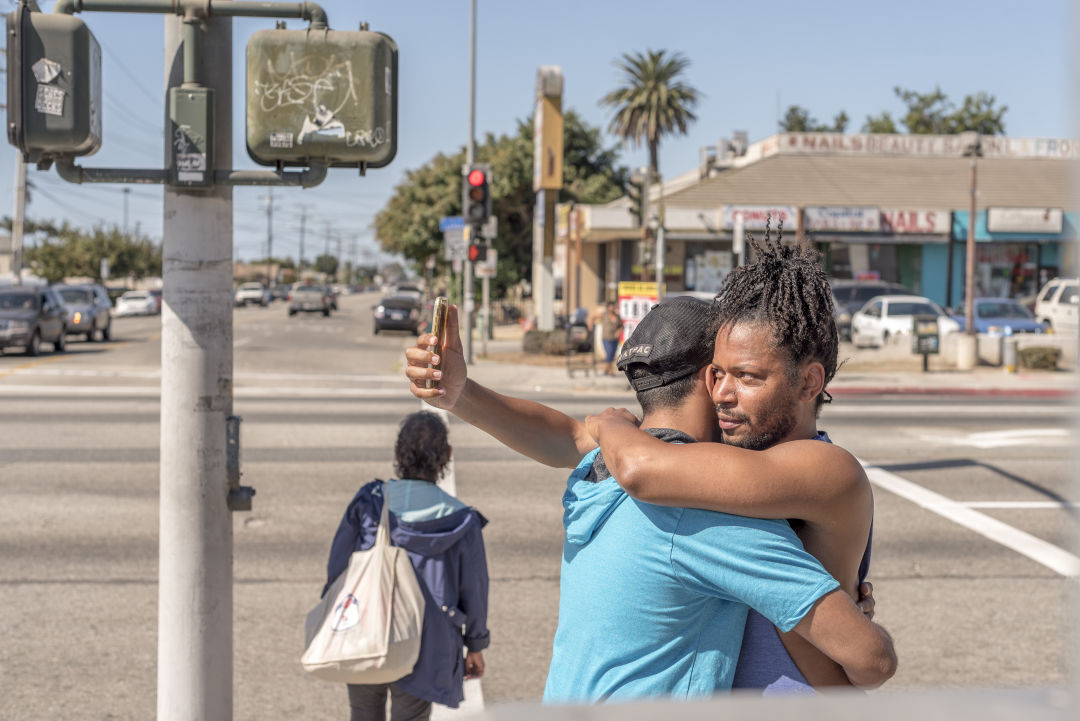A Public Procession High-Steps Through Boise-Eliot

jumatatu m. poe and Eric Sanchez in Let ’im Move You: Intervention
Image: Gema Galiana
In the spring of 2016, performers jumatatu m. poe and Jermone “Donte” Beacham were prepping a new work. The two were seven years into their study of J-setting, an exacting, acrobatic dance form that originated among women’s majorette teams at historically Black colleges in the South in the late ’70s, and was soon adopted by Black queer men (and, in this century, by Beyoncé).
This was to be the third piece in their Let ’im Move You series, and the first outside the confines of an official arts space: aptly titled Intervention, it was a public procession that found poe, Beacham, and a handful of fellow dancers swinging their arms and swiveling their hips down the sidewalks of several historically Black neighborhoods in Philadelphia.
Not everyone approved.
“We were just in regular clothes, just walking the route, doing a very light simulation of the performance,” Beacham recalls. “This guy was sitting on his porch as we were walking through, and then just by our presence alone, he got really upset and was like, ‘We don’t do that over here. We don’t want you around here, so y’all get off this block.’”
Words, as they say, were exchanged. Eventually, poe and Beacham did leave. But they returned when performance day arrived, and they’ve gone on to set Intervention in numerous other cities, including New York, Los Angeles, and Seattle. This weekend it arrives in Portland as part of the Time-Based Art Festival, with a 1.2-mile route through Albina, the historically Black district that was slashed apart in the 1950s and ’60s by the construction of I-5 and the Memorial Coliseum.
In each city, poe and Beacham bring on local performers, who get schooled on the rigors of J-setting, known as much for its call-and-response prance steps as for its explosive stunts. These locals also serve, in poe’s words, as a “research resource.” During a week of rehearsals in Portland last month, for example, the group stopped in Dawson Park—one of the few locations on the route poe and Beacham would reveal—to share memories, as well as observations on how they’ve seen the area change. The goal, poe says, is to create “a robust net of experiences.”
poe, who splits his time between Philadelphia and Durham, N.C., and Beacham, who grew up in Mississippi (the birthplace of J-setting) and is now based in Dallas, knew Intervention would introduce them to new audiences. That was largely the point. The previous works in their series had been performed in arts centers, before predominantly white audiences (including, in 2018, at TBA). Then, two weeks before Intervention’s premiere, 49 people were killed at the Pulse nightclub in Orlando, and the guerrilla-style project took on added urgency.
“Thinking about the precarity of space within Black neighborhoods, we’re dealing with histories of displacement, and also making the proclamation that we’re in the right place at the right time,” poe says. “This Black queer work, these Black queer people, are in the right place at the right time.”
Since the piece’s early days, poe and Beacham say they’re gotten defter at diffusing tension when porch sitters and passersby object to their presence. Then again, the tension is integral to the work.
“We know what we’re doing is to a certain extent flirting with danger,” poe says, recalling a group of men in Philadelphia who loudly objected to the dancers’ booty shorts and crop tops. “More times than not, there are not these instigations of danger. But they do happen, so one of the things that I try to remember is that we need to look for our support, because that’s also everywhere.”
Proof positive: the same day that group of men in Philly grew heated, a Black queer person approached the performers. They’d once lived here, they said, but had never felt at ease and so had moved to another part of the city. They’d somehow landed in the area that day and had stumbled upon the procession. Never, they told poe and Beacham, would they have expected to see this performance on this block in this neighborhood.
“That’s one of the things I’ll always remember,” poe says. “And this was right in my neighborhood. I felt so touched. It reminded me how much I need the younger versions of me—or the older versions who are actualized in different ways!—to see this work. To have an idea of some of the other possibilities.”
Let ’im Move You: Intervention
6 p.m. Fri–Sat, Oct 1–2, meets at Matt Dishman Community Center, pica.org




